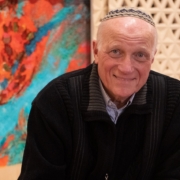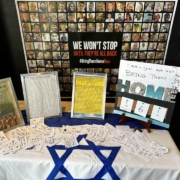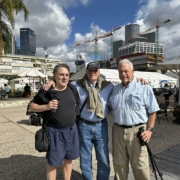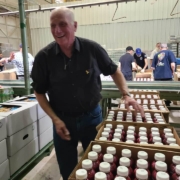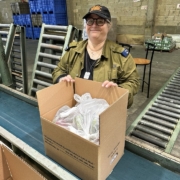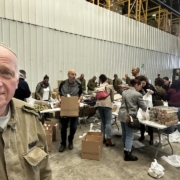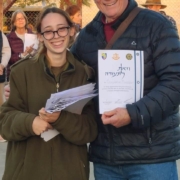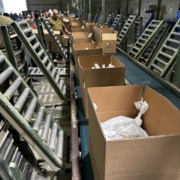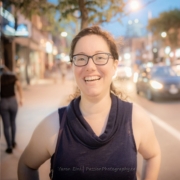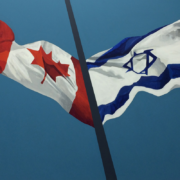Reflections on “An Open Letter To Canada’s Political Leaders” (Published in The Globe and Mail April 2, 2024)
By one of the authors of the Open Letter, Barry Campbell MP (1993-97) Holy Blossom Member
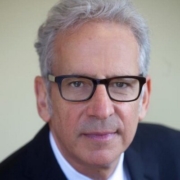 The recent immigrant was leaving my Riding office on Eglington and turned to say something more: “Mr. Campbell” he said, “When I came to Canada that was the first time I could sleep through the night unafraid”. I was very proud of Canada at that moment and in serving as a Member of Parliament. What that new Canadian said to me stayed with me for 30 years.
The recent immigrant was leaving my Riding office on Eglington and turned to say something more: “Mr. Campbell” he said, “When I came to Canada that was the first time I could sleep through the night unafraid”. I was very proud of Canada at that moment and in serving as a Member of Parliament. What that new Canadian said to me stayed with me for 30 years.
I thought about that immigrant last summer as I read about the strife between Sikhs and Indians in Canada and in the Eritrean community here who have seen their picnics and public meetings broken up by agitators from one faction or another. I thought about that immigrant when I read that Cineplex had to pull South Asian films from theatres because of drive-by shootings. I thought about the truckers blocking bridges and occupying Ottawa. I thought of the anti-vaxxers preventing doctors from entering hospitals and I began to write to Canada’s political leaders asking them to put aside partisanship and acknowledge that we have a problem which is a threat to the very social fabric of Canada.
Then the horrific events of October 7th took place and we started to experience the explosion of hate after that.
It shamed me that the Canada that immigrant described, the Canada I was so proud of on that day 30 years ago, was disappearing. Jews were afraid, but I knew that we did not have a monopoly on fear in the Canada of 2024. The letter I was writing moved from polite to urgent urging specific steps, among them the investments of time, money, and other resources necessary to understanding and reversing this dangerous trend.
The letter had to get out there.
I knew from collaborating with The Globe and Mail a few years ago (to secure funding for the surviving victims of thalidomide) that the Globe understands its responsibility as a national institution to use its platform and convening power to highlight important national issues. I also knew from the earlier work that when the Globe engaged on an important national issue they would stay with the story.
I approached the Globe about the letter, and they immediately agreed to publish it once I had signatures. They had been getting more and more concerned about the same issues the letter was focused on and about the void in political leadership to address it.
With the Globe’s promise, I set out to get signatures.
This wouldn’t be a petition but a letter to be signed by a range of concerned Canadians. I had written the letter with the important input of a very small group of people. We worked hard to craft a letter that could be widely endorsed because the problem was about more than what one community was enduring. And I sensed that making the letter about one community might cause some to dismiss it as “not my problem”.
As circulated, the letter stated that divisions over complex and often controversial current events are deep, and passions often run high. This, we said, is a sign of a vibrant, healthy democracy, except when divisions manifest themselves as intimidation, harassment and other behaviours that silence others’ voices or impede the free expression of their views. We asked that the right to just go about your life without intimidation and fear be restored as well as the right not to be forced to take a stand.
The letter did not take sides on any specific event or issue, including the Israel-Hamas war. We were optimistic that, expressed this way, the letter could be widely endorsed and be a constructive step towards promoting greater empathy and respect among Canadians of all different experiences and viewpoints. We wanted signatures to be a public demonstration of a shared commitment to safeguarding a culture of respectful dialogue and discourse in Canada.
There wasn’t time for the pitch to potential signatories to be scientific or national, as I was relying on my own network and a few friends to publicize the letter with people I didn’t know. In order to be most effective, we needed the letter to be endorsed by representatives from many communities and other concerned Canadians.
The “yield” was actually pretty high (50 signatories from less than 100 approached). The solicitation of support took place over an intense few weeks. People we approached needed to absorb and consider the initiative. Some in corporate or community organizations needed to consult internally before signing. Some wanted to talk about and understand the genesis of the initiative and the goals. Some needed to know who else would be signing. Some wanted to know that this would be more than just a letter – that there would be follow-up steps. Some signed quickly and with no questions perhaps reflecting who asked them or strong identification with the content of the letter. Some we approached were still mulling about signing when the letter was published. Some did not reply to the “ask” and it was unfair to guess why that might be. Some said they would endorse the letter after it was published.
Reflecting on this fraught time, some were shy about signing their name. Others saw signing as a way to do something when they had been feeling powerless in the face of what they have seen happening. No one we spoke to disagreed with the content or spirit of the letter.
Contacts we approached in the corporate sector applauded the letter but reported that they were taking “a pause” on signing things. This “correction” has seen them move from signing everything to signing nothing. (The former was not sustainable, the latter will not/should hold.) Some called after publication to say they regretted not signing.
I stopped when we got to 50 Canadians – clergy, ex-politicians, community leaders, arts leaders and other concerned Canadians.
The letter appeared in The Globe and Mail on Tuesday, April 2, 2024, titled: An Open Letter to Canada’s Political Leaders – for the sake of the country’s future. Alongside it the Globe Editorial Board published a powerful Editorial Board statement titled; The defence of civility rests on all of us. The letter and companion Editorial were given great prominence in both the online and print editions of the Globe. In the print edition, the letter and editorial sat side by side taking up the entire Editorial page, something which is truly unprecedented. The Globe also published an article describing the origin and context for the letter.
The Globe did what they promised.
There was a very positive reaction to the letter and companion editorial.
Media interviews (radio, TV and online), subsequent to publication consisted primarily of interviews with five ex-politicians who had signed. I was not insulted (much) to be ignored. This project wasn’t about seeking recognition. I had done my best. I’d done something and having the letter printed was like sending a child off, having done your best, holding your breath and waiting to see what would happen.
The story the media wanted to focus on was political discourse and to make the story only about how politicians speak to, or about, each other. Some of those interviewed were successful in steering the conversation back to the broad principles in the letter. The letter asked for more than civility among politicians. Opposition Leader Poilievre and Prime Minister Trudeau making nice wouldn’t make a huge impression on all the groups screaming at each other. The letter makes an urgent call for all political leaders to acknowledge and address the increasingly hostile and combative public square in Canada.
The more interesting story than why former politicians signed the letter, is perhaps why the Ghanaian Canadian Association signed or the Baha’i community or a Canadian of Japanese ancestry? She shared with me her reason for doing so, and that reason takes us all the way back to the racism of the 1940s that led to the internment of Japanese Canadians in 1942. She read the letter and thought that in 1942 if Canadians had come together as we were now, it might have changed things. This reason was a sobering history lesson. As Jews, we are not the only ones who ask: ” What if?” or think: ” If only…”
The feedback I have received is that many Canadians have been waiting for someone to say what we and the Globe said on April 2nd. Fear, frustration and concern are widespread. Canadians are not alone in the anxieties they are feeling and are hungry for the tools to address that and for more of us to model behaviours that take us forward. The letter appears to have had particular resonance in Quebec.
There were comments that there were not enough people of colour who signed. Would someone know from the names? One of the people who signed has a very common name and he’s Black. People of colour were approached to sign. They wanted to; but were constrained by policies where they work etc.
Too few women is another and a fair comment; but again the outreach was not scientific. The number of women who signed does not tell you how many were asked. If we waited for the right balance (and who decides what that is?), we may never have published. The letter is a start.
There should be opportunities for others to now endorse it or, better still, to support initiatives underway consistent with the principles in the letter. Meaningful work is being done to address matters we are concerned about. More is coming to light and more needs to be done.
The Federal Budget announced a raft of anti-hate measures. The House of Commons passed a unanimous motion condemning anti-semitism. These are all a start with more to be done.
As the Globe editorial stated, responsibility lies with all of us. We can each model better behaviour. It has been remarked that the inter and intra-community coarseness we described is seeping into everyday encounters.
My work is mostly done. It is on all of us now to listen to each other’s narratives and work to understand each other’s pain and fears. We need to move past “what aboutism” to empathy; but draw a line at intimidation, obstruction, fear and hate. It is time to resume the work of building the Canada that new Canadian spoke about 30 years ago.


